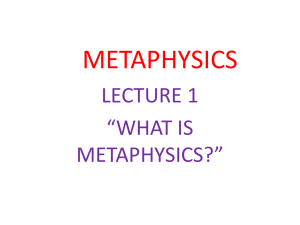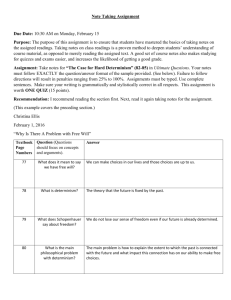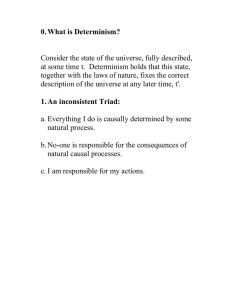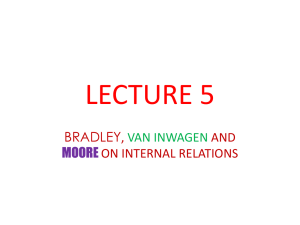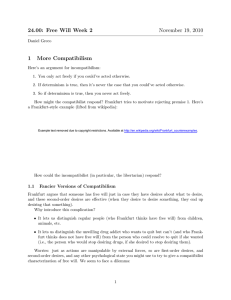Van Inwagen's Incompatibilism: Free Will & Determinism
advertisement
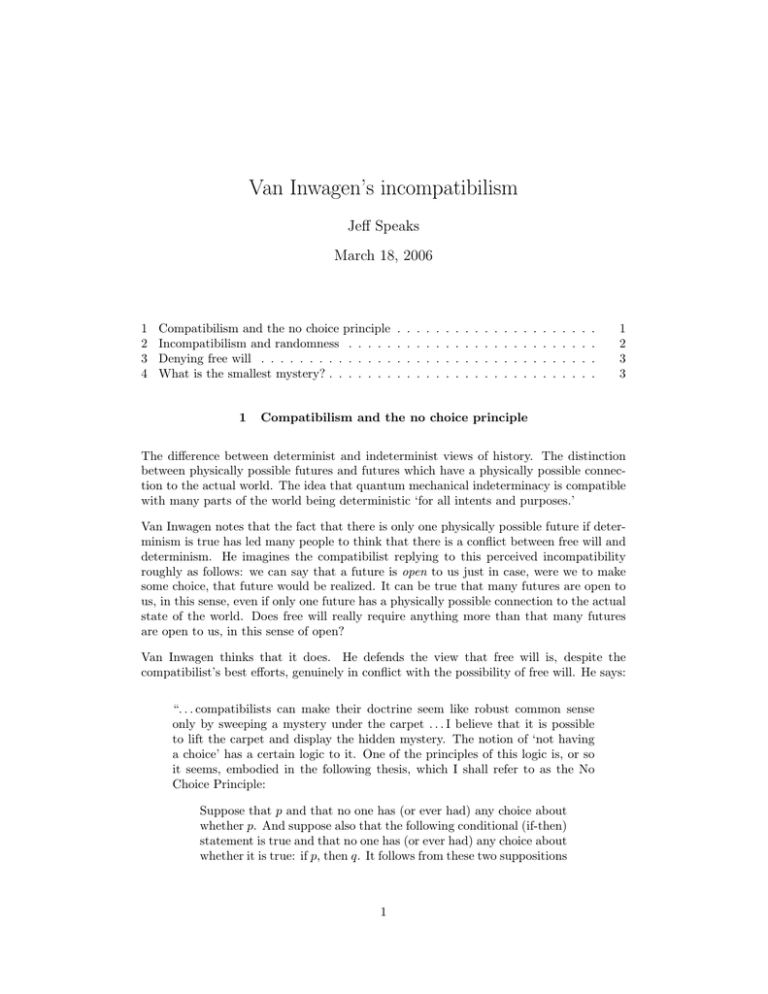
Van Inwagen’s incompatibilism Jeff Speaks March 18, 2006 1 2 3 4 Compatibilism and the no choice principle Incompatibilism and randomness . . . . . Denying free will . . . . . . . . . . . . . . What is the smallest mystery? . . . . . . . 1 . . . . . . . . . . . . . . . . . . . . . . . . . . . . . . . . . . . . . . . . . . . . . . . . . . . . . . . . . . . . . . . . . . . . . . . . . . . . . . . . . . . . 1 2 3 3 Compatibilism and the no choice principle The difference between determinist and indeterminist views of history. The distinction between physically possible futures and futures which have a physically possible connection to the actual world. The idea that quantum mechanical indeterminacy is compatible with many parts of the world being deterministic ‘for all intents and purposes.’ Van Inwagen notes that the fact that there is only one physically possible future if determinism is true has led many people to think that there is a conflict between free will and determinism. He imagines the compatibilist replying to this perceived incompatibility roughly as follows: we can say that a future is open to us just in case, were we to make some choice, that future would be realized. It can be true that many futures are open to us, in this sense, even if only one future has a physically possible connection to the actual state of the world. Does free will really require anything more than that many futures are open to us, in this sense of open? Van Inwagen thinks that it does. He defends the view that free will is, despite the compatibilist’s best efforts, genuinely in conflict with the possibility of free will. He says: “. . . compatibilists can make their doctrine seem like robust common sense only by sweeping a mystery under the carpet . . . I believe that it is possible to lift the carpet and display the hidden mystery. The notion of ‘not having a choice’ has a certain logic to it. One of the principles of this logic is, or so it seems, embodied in the following thesis, which I shall refer to as the No Choice Principle: Suppose that p and that no one has (or ever had) any choice about whether p. And suppose also that the following conditional (if-then) statement is true and that no one has (or ever had) any choice about whether it is true: if p, then q. It follows from these two suppositions 1 that q and that no one has (or ever had) any choice about whether q. . . . The No Choice Principle seems undeniably correct. How could I have a choice about anything that is an inevitably consequence of something I have no choice about? And yet . . . the compatibilist must deny the No Choice Principle.” The similarity of this argument to Edwards’s argument for the incompatibility of free will and divine foreknowledge. 2 Incompatibilism and randomness If you think that we have free will, then the above argument might incline you to think that determinism is false. But, as van Inwagen notes, the combination of free will with indeterminism can also seem problematic: “Let us look carefully at the consequences of supposing that human behavior is undetermined . . . Let us suppose that there is a certain current-pulse that is proceeding along one of the neural pathways in Jane’s brain and that it is about to come to a fork. And let us suppose that if it goes to the left, she will make her confession;, and that if it goes to the right, she will remain silent. And let us suppose that it is undetermined which way the pulse goes when it comes to the fork: even an omniscient being with a complete knowledge of the state of Jane’s brain and a complete knowledge of the laws of physics and unlimited powers of calculation could say no more than: ‘The laws and present state of her brain would allow the pulse to go either way; consequently, no prediction of what the pulse will do when it comes to the fork is possible; it might go to the left, and it might go to the right, and that’s all there is to be said.’ Now let us ask: does Jane have any choice about whether the pulse goes to the left or to the right? If we think about this question for a moment, we shall see that it is very hard to see how she could have any choice about that. . . . There is no way for her to make it go one way rather than the other. Or, at least, there is no way for her to make it go one way rather than the other and leave the ‘choice’ it makes an undetermined event.” The distinction between agent causation and event causation. The attempt to solve the above problem via agent causation; why this makes the event in question caused without entailing, via the No Choice Principle, that the agent has no choice about the action. Some problems about agent causation. 2 3 Denying free will It might seem at this point as though belief in free will, whether accompanied by compatibilism or incompatibilism, leads to very serious problems. This might lead you to think that the best position on the issue would be to give up belief in free will altogether. Why this is difficult to do. van Inwagen’s argument that it would be impossible for someone who really did not believe in free will to decide what to do, based on the principle that it is impossible to try to decide whether to do x or y unless one believes that both x and y are possible for one to do. If this is correct, everyone believes in free will; the beliefs of philosophers who also deny free will are therefore inconsistent. 4 What is the smallest mystery? The possible views on free will break down into three: • Compatibilism + belief in free will • Incompatibilism + belief in free will • The denial of free will van Inwagen’s view is that each of these three positions on the issue face difficulties — each, has he puts it, involves a mystery of some kind. He therefore thinks that we should decide between them on the basis of which involves the least difficulties — which involves the smallest mystery. He thinks that this favors the second option. Some reasons for thinking that this is plausible. A return to the problem of evil, and its connection to the debate about compatibilism. 3
